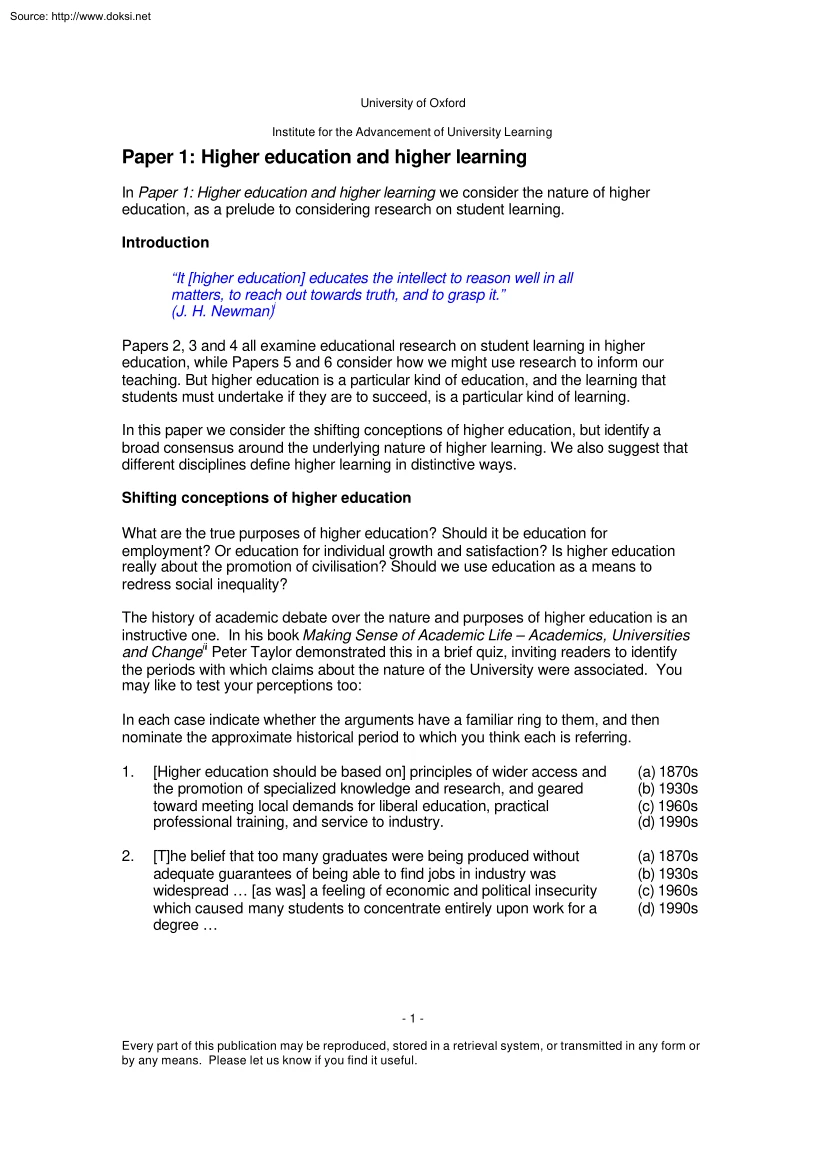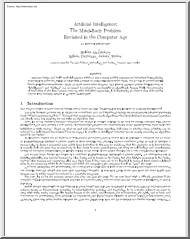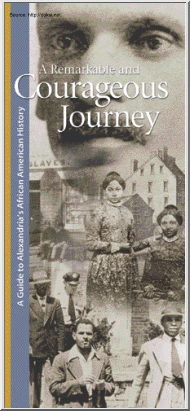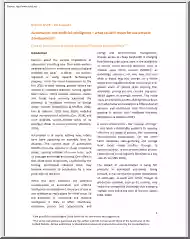Please log in to read this in our online viewer!

Please log in to read this in our online viewer!
No comments yet. You can be the first!
What did others read after this?
Content extract
Source: http://www.doksinet University of Oxford Institute for the Advancement of University Learning Paper 1: Higher education and higher learning In Paper 1: Higher education and higher learning we consider the nature of higher education, as a prelude to considering research on student learning. Introduction “It [higher education] educates the intellect to reason well in all matters, to reach out towards truth, and to grasp it.” (J. H Newman)i Papers 2, 3 and 4 all examine educational research on student learning in higher education, while Papers 5 and 6 consider how we might use research to inform our teaching. But higher education is a particular kind of education, and the learning that students must undertake if they are to succeed, is a particular kind of learning. In this paper we consider the shifting conceptions of higher education, but identify a broad consensus around the underlying nature of higher learning. We also suggest that different disciplines define higher
learning in distinctive ways. Shifting conceptions of higher education What are the true purposes of higher education? Should it be education for employment? Or education for individual growth and satisfaction? Is higher education really about the promotion of civilisation? Should we use education as a means to redress social inequality? The history of academic debate over the nature and purposes of higher education is an instructive one. In his book Making Sense of Academic Life – Academics, Universities and Changeiii Peter Taylor demonstrated this in a brief quiz, inviting readers to identify the periods with which claims about the nature of the University were associated. You may like to test your perceptions too: In each case indicate whether the arguments have a familiar ring to them, and then nominate the approximate historical period to which you think each is referring. 1. [Higher education should be based on] principles of wider access and the promotion of specialized
knowledge and research, and geared toward meeting local demands for liberal education, practical professional training, and service to industry. (a) 1870s (b) 1930s (c) 1960s (d) 1990s 2. [T]he belief that too many graduates were being produced without adequate guarantees of being able to find jobs in industry was widespread [as was] a feeling of economic and political insecurity which caused many students to concentrate entirely upon work for a degree (a) 1870s (b) 1930s (c) 1960s (d) 1990s -1Every part of this publication may be reproduced, stored in a retrieval system, or transmitted in any form or by any means. Please let us know if you find it useful Source: http://www.doksinet University of Oxford Institute for the Advancement of University Learning 3. Grounds for promotion should not include just scholarly accomplishment but also teaching competence – the professional teaching role and duty of the universities to be teaching institutions were emphasized (a) 1870s
(b) 1900s (c) 1930s (d) 1990s 4. Politicians wanted the universities to provide degrees which would meet the needs of occupational life. They also wanted bureaucratic supervision of tuition and examining, and information about academic ‘productivity’ (a) 1870s (b) 1990s (c) 1930s (d) 1990s 5. Most professors now accepted an organizational framework separating managerial and academic matters administrative competence tended to be kept distinct from scholarly competence, and to be valued more highly. [They thought] that the new framework would be more efficient and rational than the old collegial determination. (a) 1860s (b) 1910s (c) 1950s (d) 1990s The historical times to which each of the statements is referring are: I: 1870s (Barnes iii 1996: 276); 2: 1930s (Barnes 1996: 279); 3: 1990s (Blomqvistiv 1997: 181); 4: 1900s (Blomqvist 1997: 181); and 5: 1910s (Blomqvist 1997: 182). It may seem as though the nature and scope of higher education is being determined by the
economic and political concerns of the last decade of the twentieth century. It is clear, however, that for the past hundred or so years the same issues and dilemmas have underpinned the development of tertiary institutions. A consensus on higher learning In spite of constantly shifting accounts of the purpose of higher education, however, among academics there exists a core of consensus about what comprises higher learning. In an essay first published in 1929, A.NWhitehead wrote: The university imparts information, but it imparts it imaginatively. This atmosphere of excitement, arising from imaginative consideration, transforms knowledge. A fact is no longer a bare fact: it is invested with all its possibilities. It is no longer a burden on the memory: it is energising as the poet of our dreams, and as the architect of our purposes. Imagination is not to be divorced from the facts: it is a way of illuminating the facts. It works by eliciting the general principles which apply to the
facts, as they exist, and then by an intellectual survey of alternative possibilities which are consistent with those principles. v Some fifty years later the UK Council for National Academic Awards (now defunct) described the aims of higher education as: -2Every part of this publication may be reproduced, stored in a retrieval system, or transmitted in any form or by any means. Please let us know if you find it useful Source: http://www.doksinet University of Oxford Institute for the Advancement of University Learning The development of students’ intellectual and imaginative powers; their understanding and judgement; their problem-solving skills; their ability to communicate; their ability to see relationships within what they have learned and to perceive their field of study in a broader perspective. [It] must aim to stimulate an enquiring, analytical and creative approach, encouraging independent judgement and critical self-awareness. Adding only that we aim for excellence
and pursue it through rigorous study, many Oxford academics would endorse this vision of higher education as the pursuit of higherorder cognitive capabilities in the context of disciplinary knowledge. University academics consistently articulate conceptions of learning which revolve around students’ mastery of a higher order of abilities. This is as true of the sciences as it is the arts. It is often said of the sciences that there is a great deal of factual material that students must learn in their undergraduate years before they can move into the more contested – and interesting – areas of their subject. But even where thorough understanding of a body of knowledge is regarded as the essential pre-requisite to more creative endeavour, academics do not want their students just to parrot random groups of facts. We expect that students will learn to do more than selectively reproduce information. We want them to be able to apply their knowledge to novel problems, to understand the
weight and status of different principles, to appreciate the limits of their current knowledge, and so on. This requires that they are active in developing skills, aptitudes, and habits of mind that reflect their increasing understanding of the nature of their discipline. Only through learning to think critically about the discipline-based knowledge to which they are introduced, are students able to reconstitute knowledge as a flexible tool they can use themselves for their own ends. Higher learning in disciplines Alongside generalized aspirations for higher education of the kind we have outlined, academics also embrace particular visions of learning specific to the disciplines. In Entwistle and Percy’s influential study of conceptions of teaching, academics in different fields spoke quite differently about their core conceptions of higher learning. History lecturers spoke, for example, about students’ need to acquire an attitude of social awareness, and a rigorous approach towards
the use of evidence. Physicists, on the other hand, spoke about the importance to the student of learning to interpret and analyse experimental data.vi The importance of thinking about teaching within the context of a discipline has long been reflected in the activities of professional bodies and subject associations. This is now being built upon through the activity of the UK’s Learning and Teaching Support Network, discipline-based centres of expertise offering support and guidance on approaches to teaching within disciplines. -3Every part of this publication may be reproduced, stored in a retrieval system, or transmitted in any form or by any means. Please let us know if you find it useful Source: http://www.doksinet University of Oxford Institute for the Advancement of University Learning The challenge of real higher education Professor Ronald Barnett has recently written that: A genuine higher learning is subversive in the sense of subverting the student’s
taken-for-granted world, including the world of endeavour, scholarship, calculation or creativity, into which he or she has been initiated. A genuine higher education is unsettling; it is not meant to be a cosy experience. It is disturbing because, ultimately, the student comes to see that things could always be other than they are. A higher education experience is not complete unless the student realizes that, no matter how much effort is put in, or how much library research, there are no final answers.vii Many academics will recognise the challenge to both learners and educators that is encapsulated in this quotation. While some advocates of accountability and educational efficiency tend to represent higher education as a knowledge assembly line, academics are aware that we are engaged in a more complex project. Students are not our products but our partners in an endeavour that has life-changing implications for them. Working at Harvard in the nineteen-fifties, William Perry
recognised that students were profoundly challenged by the contestable nature of higher learning. This realisation prompted him to carry out what became a seminal study of student intellectual development. Paper 4: Intellectual and Ethical Development in the College Years discusses Perry’s study and its implications. Barnett claims that “genuine higher learning is subversive in the sense of subverting the student’s taken-for-granted world”. If Barnett is correct, surely a genuine higher education must also subvert the taken-for-granted world of others – parents, governments and other ‘stakeholders’? Should genuine higher education also confront and subvert the settled perceptions of those of us responsible for delivering it? Readers interested in considering some of these issues further may wish to download from this site Professor Richard Pring’s recent essay The Changing Nature of Universities: economic relevance, social inclusion or personal excellence?:
http://www.learningoxacuk/iaul/ProfPringpdf i J.H Newman The Idea of a University (1873) p 95 Peter G. Taylor, Making Sense of Academic Life – Academics, Universities, and Change (Buckingham: SRHE & Open University Press, 1992) iii S.V Barnes ‘England’s civic universities and the triumph of the Oxbridge ideal’ in History of Educational Quarterly 36:271 - 305 iv G. Blomqvist ‘State, university, and academic freedom in Sweden: the Universities of Uppsala and Lund between 1820 and 1920 Minerva 35: 171 – 194 v ‘Universities and their function’ in The Aims of Education and Other Essays (New York: Free Press, 1967) cited in P. Ramsden Learning to Teach in Higher Education (London: Routledge, 1992) p. 19 vi N.J Entwistle and KA Percy ‘Critical thinking or conformity? An investigation into the aims and outcomes of higher education’ in Research into Higher Education (London: SRHE, 1973) ii -4Every part of this publication may be reproduced, stored in a retrieval
system, or transmitted in any form or by any means. Please let us know if you find it useful Source: http://www.doksinet University of Oxford Institute for the Advancement of University Learning vii R. Barnett The Idea of Higher Education (Buckingham: Open University Press and SRHE, 1990) p. 155 -5Every part of this publication may be reproduced, stored in a retrieval system, or transmitted in any form or by any means. Please let us know if you find it useful
learning in distinctive ways. Shifting conceptions of higher education What are the true purposes of higher education? Should it be education for employment? Or education for individual growth and satisfaction? Is higher education really about the promotion of civilisation? Should we use education as a means to redress social inequality? The history of academic debate over the nature and purposes of higher education is an instructive one. In his book Making Sense of Academic Life – Academics, Universities and Changeiii Peter Taylor demonstrated this in a brief quiz, inviting readers to identify the periods with which claims about the nature of the University were associated. You may like to test your perceptions too: In each case indicate whether the arguments have a familiar ring to them, and then nominate the approximate historical period to which you think each is referring. 1. [Higher education should be based on] principles of wider access and the promotion of specialized
knowledge and research, and geared toward meeting local demands for liberal education, practical professional training, and service to industry. (a) 1870s (b) 1930s (c) 1960s (d) 1990s 2. [T]he belief that too many graduates were being produced without adequate guarantees of being able to find jobs in industry was widespread [as was] a feeling of economic and political insecurity which caused many students to concentrate entirely upon work for a degree (a) 1870s (b) 1930s (c) 1960s (d) 1990s -1Every part of this publication may be reproduced, stored in a retrieval system, or transmitted in any form or by any means. Please let us know if you find it useful Source: http://www.doksinet University of Oxford Institute for the Advancement of University Learning 3. Grounds for promotion should not include just scholarly accomplishment but also teaching competence – the professional teaching role and duty of the universities to be teaching institutions were emphasized (a) 1870s
(b) 1900s (c) 1930s (d) 1990s 4. Politicians wanted the universities to provide degrees which would meet the needs of occupational life. They also wanted bureaucratic supervision of tuition and examining, and information about academic ‘productivity’ (a) 1870s (b) 1990s (c) 1930s (d) 1990s 5. Most professors now accepted an organizational framework separating managerial and academic matters administrative competence tended to be kept distinct from scholarly competence, and to be valued more highly. [They thought] that the new framework would be more efficient and rational than the old collegial determination. (a) 1860s (b) 1910s (c) 1950s (d) 1990s The historical times to which each of the statements is referring are: I: 1870s (Barnes iii 1996: 276); 2: 1930s (Barnes 1996: 279); 3: 1990s (Blomqvistiv 1997: 181); 4: 1900s (Blomqvist 1997: 181); and 5: 1910s (Blomqvist 1997: 182). It may seem as though the nature and scope of higher education is being determined by the
economic and political concerns of the last decade of the twentieth century. It is clear, however, that for the past hundred or so years the same issues and dilemmas have underpinned the development of tertiary institutions. A consensus on higher learning In spite of constantly shifting accounts of the purpose of higher education, however, among academics there exists a core of consensus about what comprises higher learning. In an essay first published in 1929, A.NWhitehead wrote: The university imparts information, but it imparts it imaginatively. This atmosphere of excitement, arising from imaginative consideration, transforms knowledge. A fact is no longer a bare fact: it is invested with all its possibilities. It is no longer a burden on the memory: it is energising as the poet of our dreams, and as the architect of our purposes. Imagination is not to be divorced from the facts: it is a way of illuminating the facts. It works by eliciting the general principles which apply to the
facts, as they exist, and then by an intellectual survey of alternative possibilities which are consistent with those principles. v Some fifty years later the UK Council for National Academic Awards (now defunct) described the aims of higher education as: -2Every part of this publication may be reproduced, stored in a retrieval system, or transmitted in any form or by any means. Please let us know if you find it useful Source: http://www.doksinet University of Oxford Institute for the Advancement of University Learning The development of students’ intellectual and imaginative powers; their understanding and judgement; their problem-solving skills; their ability to communicate; their ability to see relationships within what they have learned and to perceive their field of study in a broader perspective. [It] must aim to stimulate an enquiring, analytical and creative approach, encouraging independent judgement and critical self-awareness. Adding only that we aim for excellence
and pursue it through rigorous study, many Oxford academics would endorse this vision of higher education as the pursuit of higherorder cognitive capabilities in the context of disciplinary knowledge. University academics consistently articulate conceptions of learning which revolve around students’ mastery of a higher order of abilities. This is as true of the sciences as it is the arts. It is often said of the sciences that there is a great deal of factual material that students must learn in their undergraduate years before they can move into the more contested – and interesting – areas of their subject. But even where thorough understanding of a body of knowledge is regarded as the essential pre-requisite to more creative endeavour, academics do not want their students just to parrot random groups of facts. We expect that students will learn to do more than selectively reproduce information. We want them to be able to apply their knowledge to novel problems, to understand the
weight and status of different principles, to appreciate the limits of their current knowledge, and so on. This requires that they are active in developing skills, aptitudes, and habits of mind that reflect their increasing understanding of the nature of their discipline. Only through learning to think critically about the discipline-based knowledge to which they are introduced, are students able to reconstitute knowledge as a flexible tool they can use themselves for their own ends. Higher learning in disciplines Alongside generalized aspirations for higher education of the kind we have outlined, academics also embrace particular visions of learning specific to the disciplines. In Entwistle and Percy’s influential study of conceptions of teaching, academics in different fields spoke quite differently about their core conceptions of higher learning. History lecturers spoke, for example, about students’ need to acquire an attitude of social awareness, and a rigorous approach towards
the use of evidence. Physicists, on the other hand, spoke about the importance to the student of learning to interpret and analyse experimental data.vi The importance of thinking about teaching within the context of a discipline has long been reflected in the activities of professional bodies and subject associations. This is now being built upon through the activity of the UK’s Learning and Teaching Support Network, discipline-based centres of expertise offering support and guidance on approaches to teaching within disciplines. -3Every part of this publication may be reproduced, stored in a retrieval system, or transmitted in any form or by any means. Please let us know if you find it useful Source: http://www.doksinet University of Oxford Institute for the Advancement of University Learning The challenge of real higher education Professor Ronald Barnett has recently written that: A genuine higher learning is subversive in the sense of subverting the student’s
taken-for-granted world, including the world of endeavour, scholarship, calculation or creativity, into which he or she has been initiated. A genuine higher education is unsettling; it is not meant to be a cosy experience. It is disturbing because, ultimately, the student comes to see that things could always be other than they are. A higher education experience is not complete unless the student realizes that, no matter how much effort is put in, or how much library research, there are no final answers.vii Many academics will recognise the challenge to both learners and educators that is encapsulated in this quotation. While some advocates of accountability and educational efficiency tend to represent higher education as a knowledge assembly line, academics are aware that we are engaged in a more complex project. Students are not our products but our partners in an endeavour that has life-changing implications for them. Working at Harvard in the nineteen-fifties, William Perry
recognised that students were profoundly challenged by the contestable nature of higher learning. This realisation prompted him to carry out what became a seminal study of student intellectual development. Paper 4: Intellectual and Ethical Development in the College Years discusses Perry’s study and its implications. Barnett claims that “genuine higher learning is subversive in the sense of subverting the student’s taken-for-granted world”. If Barnett is correct, surely a genuine higher education must also subvert the taken-for-granted world of others – parents, governments and other ‘stakeholders’? Should genuine higher education also confront and subvert the settled perceptions of those of us responsible for delivering it? Readers interested in considering some of these issues further may wish to download from this site Professor Richard Pring’s recent essay The Changing Nature of Universities: economic relevance, social inclusion or personal excellence?:
http://www.learningoxacuk/iaul/ProfPringpdf i J.H Newman The Idea of a University (1873) p 95 Peter G. Taylor, Making Sense of Academic Life – Academics, Universities, and Change (Buckingham: SRHE & Open University Press, 1992) iii S.V Barnes ‘England’s civic universities and the triumph of the Oxbridge ideal’ in History of Educational Quarterly 36:271 - 305 iv G. Blomqvist ‘State, university, and academic freedom in Sweden: the Universities of Uppsala and Lund between 1820 and 1920 Minerva 35: 171 – 194 v ‘Universities and their function’ in The Aims of Education and Other Essays (New York: Free Press, 1967) cited in P. Ramsden Learning to Teach in Higher Education (London: Routledge, 1992) p. 19 vi N.J Entwistle and KA Percy ‘Critical thinking or conformity? An investigation into the aims and outcomes of higher education’ in Research into Higher Education (London: SRHE, 1973) ii -4Every part of this publication may be reproduced, stored in a retrieval
system, or transmitted in any form or by any means. Please let us know if you find it useful Source: http://www.doksinet University of Oxford Institute for the Advancement of University Learning vii R. Barnett The Idea of Higher Education (Buckingham: Open University Press and SRHE, 1990) p. 155 -5Every part of this publication may be reproduced, stored in a retrieval system, or transmitted in any form or by any means. Please let us know if you find it useful




 Just like you draw up a plan when you’re going to war, building a house, or even going on vacation, you need to draw up a plan for your business. This tutorial will help you to clearly see where you are and make it possible to understand where you’re going.
Just like you draw up a plan when you’re going to war, building a house, or even going on vacation, you need to draw up a plan for your business. This tutorial will help you to clearly see where you are and make it possible to understand where you’re going.